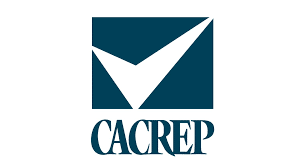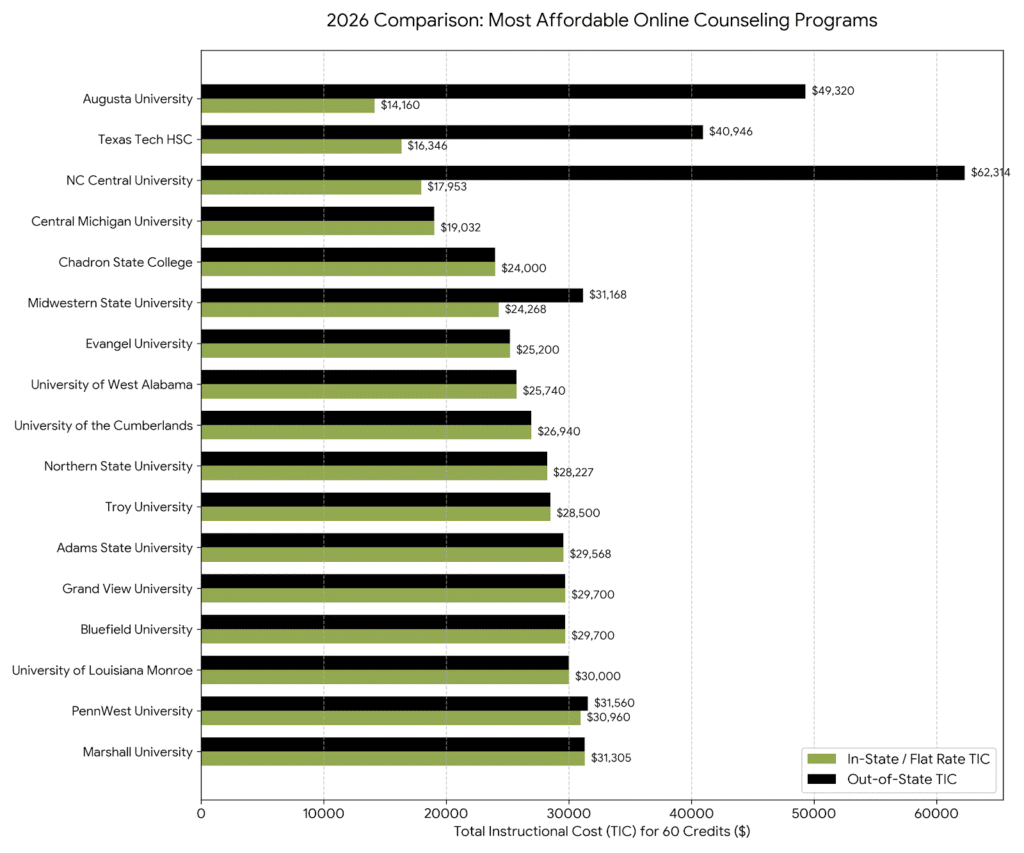2026 Counseling Tuition Audit
While many programs advertise “under $5k/year,” the true Total Instructional Cost (TIC) for a 60-credit licensure-track degree in 2026 ranges from $16,346 to $31,560. We have audited over 100 CACREP-accredited programs to identify the true “bottom line” costs, including mandatory online learning fees that can add up to $1,600 to your final bill.
The demand for qualified mental health professionals continues to grow across the United States, with Licensed Professional Counselors (LPCs) playing a crucial role in delivering accessible and effective care. For those considering this rewarding career path, earning a counseling degree is a necessary first step—but the cost of graduate education can be a major barrier.
Fortunately, many schools now offer affordable online counseling degrees—options that are more budget-friendly than many traditional programs while still meeting licensure requirements. While graduate school is still a substantial financial commitment, these programs aim to reduce costs without compromising on quality or flexibility.
This guide spotlights some of the cheapest online LPC programs for the 2025–2026 academic year. Whether you’re just beginning your search or narrowing down your options, understanding how to find high-quality, low-cost programs can help you make a smart investment in your future.
Why Trust MSW Degrees for Counseling Program Research?
At MSW Degrees, our counseling-related content is created and reviewed by professionals with graduate-level training in counseling, social work, and behavioral health fields who understand counseling curricula, accreditation, and licensure pathways. We rely on authoritative sources such as the Council for Accreditation of Counseling and Related Educational Programs (CACREP), the National Center for Education Statistics (NCES), and state counseling licensure boards to ensure program information is accurate and current.
Our counseling resources, program guides and rankings follow transparent, education-focused methodologies and are developed independently from advertisers or institutional partnerships. Our goal is to provide clear, unbiased guidance to help you compare counseling programs with confidence.

Our Counseling Review Process
-
Evaluation of accredited online and on-campus counseling programs nationwide
-
Program data verified using CACREP, NCES, and official state counseling licensure board resources
-
Counseling program guides and rankings reviewed by graduate-level counseling or social work subject matter experts
-
Content updated regularly to reflect accreditation status, tuition changes, and evolving licensure requirements
-
Only programs meeting clear affordability, accreditation, and quality standards are included in our rankings
What to Look For in an Affordable Online LPC Program
To become a Licensed Professional Counselor (LPC), you’ll typically need to earn a master’s degree in counseling from a program that includes both academic coursework and supervised clinical experience. While degree titles can vary—such as Master of Arts in Counseling, Master of Science in Clinical Mental Health Counseling, or similar—the curriculum must meet your state’s licensing requirements. Choosing the right program is an essential step toward licensure and a career as a counselor.
When researching an online master’s in counseling, affordability is only part of the equation. To ensure the program supports both your budget and your long-term career goals, consider the following key factors:
Accreditation
Look for a CACREP-accredited counseling program. Accreditation from the Council for Accreditation of Counseling and Related Educational Programs (CACREP) ensures the curriculum meets national standards and can streamline the licensure process in many states.
Online Flexibility and Program Format
Consider whether the program offers asynchronous courses, synchronous class meetings, or hybrid formats. Some programs follow a cohort model with structured timelines, while others allow more flexibility to move at your own pace.
In-State vs. Out-of-State Tuition
Many public universities offer discounted tuition to in-state residents, but some online programs have a flat-rate tuition regardless of residency. Verifying these details early on can help you avoid unexpected costs.
Clinical Requirements and Support
All LPC programs require clinical fieldwork, including a practicum and internship. These must usually be completed in person. Look for programs that offer support in securing placements and provide qualified local supervisors to meet your state’s requirements.
Total Program Cost
Beyond tuition, factor in additional expenses such as student fees, textbooks, clinical liability insurance, and technology costs. The most affordable programs are transparent about total costs and often provide tuition calculators or breakdowns online.
2026 Most Affordable Online Counseling Programs for Aspiring LPCs
This list highlights some of the most affordable online master’s-level counseling programs accredited by the Council for Accreditation of Counseling and Related Educational Programs (CACREP). All featured programs include a clinical mental health counseling track and are offered in fully online or primarily online formats.
How We Built This List: The TIC Methodology
To create this list, we moved beyond standard tuition advertisements to calculate the Total Instructional Cost (TIC) for every CACREP-accredited online pathway. Our goal was to identify the true “bottom-line” cost of becoming a Licensed Professional Counselor (LPC) in 2026.
Step 1: Beyond the “Sticker Price”
Most ranking sites rely on IPEDS data, which often only reports base tuition. For online learners, this “sticker price” is rarely the actual price paid. We conducted a manual audit of current institutional bursar records to account for:
- Mandatory Online Delivery Fees: These “e-learning” surcharges often range from $50–$150 per credit and are frequently omitted from the primary tuition page.
- Clinical & Supervision Fees: Mandatory fees for clinical tracking software (like Tevera or Time2Track) and professional liability insurance required for practicums.
- Technology & Infrastructure Levies: Annual fees for LMS (Learning Management System) access and virtual library resources.
Step 2: The 60-Credit Economic Audit
Because many graduate students attend part-time or transfer credits, we broke every program down to a Per-Credit TIC. This allowed us to calculate the Total 60-Credit Licensure Cost across 100+ audited programs.
- The “Zero-Surprise” Standard: We removed programs where the TIC was more than 15% higher than the advertised rate, ensuring our “Affordable” picks remain honest reflections of your final bill.
TIC vs. Advertised Tuition: The “Hidden Fee” Reality
To illustrate why this audit matters, look at the difference between what schools say it costs and what a licensure-track student actually pays over 60 credits.
| Expense Category | Advertised “Base” Tuition | Total Instructional Cost (TIC) | The “Hidden” Difference |
| Tuition (60 Credits) | $18,000 – $24,000 | $18,000 – $24,000 | $0 |
| Distance Learning Fees | Often Not Listed | $3,000 – $9,000 | +$100/credit avg |
| Clinical/Internship Fees | Included in “Fees” | $600 – $1,200 | Software & Insurance |
| Graduation & Admin Fees | Hidden in Fine Print | $400 – $800 | App & Degree Fees |
| Est. Total Out-of-Pocket | $18,000 – $24,000 | $22,000 – $35,000 | +20-40% Increase |

1. Augusta University Master of Education in Counselor Education
- Location: Augusta, GA
- Program Type: M.Ed.
- Total Instructional Cost (TIC): ~$14,160 (In-State) | ~$49,320 (Out-of-State)
- Baseline Rate: $236 per credit hour.
- The “Hidden Fee” Audit: Students enrolled in 100% distance learning pay a mandatory $393 Online Learning Fee per semester plus a $100 Clinical/Internship Fee.
- Best For: Georgia residents seeking a Master of Education (M.Ed.) in Counselor Education with a Clinical Mental Health focus.
- Additional Insight: Augusta holds the title for the absolute lowest in-state TIC on this list, but out-of-state students should weigh the significant nonresident surcharge.
2. Texas Tech University Health Sciences Center Master of Science in Clinical Mental Health Counseling
- Location: Lubbock, TX
- Program Type: M.S.
- Total Instructional Cost (TIC): ~$16,346 (In-State) | ~$31,616 (Non-Resident)
- Baseline Rate: $272 per credit (In-State) | $682 (Non-Resident).
- The “Hidden Fee” Audit: TTUHSC is highly affordable but carries a mandatory $3,084 in institutional fees and an estimated $1,250 for books/supplies that must be factored into the 60-credit total.
- Best For: Texas residents seeking a highly respected medical-school-affiliated counseling degree.
- Additional Insight: Often identified as the “Absolute ROI Leader” for Texas residents. The out-of-state rate is competitive but no longer the lowest on the list once fees are applied.
3. North Carolina Central University Clinical Mental Health Program
- Location: Durham, NC
- Program Type: M.A.
- Total Instructional Cost (TIC): ~$17,953 (In-State) | ~$62,314 (Out-of-State)
- Baseline Rate: ~$300 per credit (In-State).
- The “Hidden Fee” Audit: Features a high $1,396 Graduate Student Insurance fee that can be waived with proof of private coverage, potentially saving students nearly $3,000 over the program duration.
- Best For: Aspiring LPCs in North Carolina who want a prestigious, historically-focused institution with high licensure pass rates.
- Additional Insight: NCCU is often cited as a “Best Value” for resident students, but it is one of the most expensive options for non-residents.
4. Central Michigan University Master of Arts in Counseling (Clinical Mental Health Counseling concentration, Online)
- Location: Mount Pleasant, MI
- Program Type: M.A.
- Total Instructional Cost (TIC): ~$19,032 (Flat-Rate National)
- Baseline Rate: $317 per credit hour.
- The “Hidden Fee” Audit: CMU utilizes a $225 Student Services Fee per semester. Total degree cost is capped by their aggressive 60-credit “Velocity” track.
- Best For: Out-of-state students seeking a public university brand without the “Non-Resident” price hike.
- Additional Insight: CMU is the “Flat-Rate Leader” on this list, providing price parity for students regardless of their geographic location.
5. Chadron State College Online Master of Arts in Education (MAE) in Clinical Mental Health Counseling
- Location: Chadron, NE
- Program Type: M.A.E.
- Total Instructional Cost (TIC): ~$24,720 (Online Flat-Rate)
- Baseline Rate: $412 per credit.
- The “Hidden Fee” Audit: Chadron is remarkably transparent, with few “ancillary” fees. Budget an additional $1,200 for textbooks and licensure prep materials over the 3-year track.
- Best For: Students seeking a Master of Arts in Education (M.A.E.) in Clinical Mental Health Counseling with a focus on rural mental health.
- Additional Insight: Often cited for its “Low Friction” admissions process and consistent year-round course availability.
6. Midwestern State University M.A. Clinical Mental Health Counseling
- Location: Wichita Falls, TX
- Program Type: M.A.
- Total Instructional Cost (TIC): ~$24,268 (In-State) | ~$31,168 (Out-of-State)
- Baseline Rate: ~$404 per credit (In-State).
- The “Hidden Fee” Audit: Out-of-state students benefit from a competitive non-resident rate. Note the $24/credit Health Sciences fee and a $60 University Security fee per semester.
- Additional Insight: MSU Texas is a “hidden gem” for residents of Oklahoma and other border states who may qualify for significant tuition waivers, potentially lowering the Total Instituional Cost (TIC) to under $20k.
7. Evangel University Master of Science in Clinical Mental Health Counseling (Online)
- Location: Springfield, MO
- Program Type: M.S.
- Total Instructional Cost (TIC): ~$25,200
- Baseline Rate: $420 per credit hour.
- The “Hidden Fee” Audit: Includes a $100 Technology Fee and $225 Student Fee per semester.
- Additional Insight: Evangel is a top choice for students seeking a Faith-Integrated Clinical Mental Health Counseling program at a secular-competitive price point.
8. University of West Alabama Master’s in Clinical Mental Health Counseling
- Location: Livingston, AL
- Program Type: M.S.
- Total Instructional Cost (TIC): ~$25,740
- Baseline Rate: $429 per credit hour.
- The “Hidden Fee” Audit: Includes a $75 technology fee per semester.
- Additional Insight: UWA’s 8-week course cycles make it a premier choice for students who want to accelerate their degree without waiting for traditional 16-week semester starts.
9. University of the Cumberlands Online Master’s in Clinical Mental Health Counseling
- Location: Williamsburg, KY
- Program Type: M.A.
- Total Instructional Cost (TIC): ~$26,940
- Baseline Rate: $449 per credit hour.
- The “Hidden Fee” Audit: One of the most aggressive “all-in” pricing models in the country. Fees are largely bundled into the credit rate.
- Additional Insight: Consistently ranked as a “Top” budget option due to its massive scale and 100% online accessibility.
10. Northern State University Clinical Mental Health Counseling
- Location: Aberdeen, SD
- Program Type: M.S.Ed.
- Total Instructional Cost (TIC): ~$29,046
- Baseline Rate: $484.10 per credit hour.
- The “Hidden Fee” Audit: Northern State offers a Flat-Rate Online Tuition with no additional out-of-state differential.
- Additional Insight: This is the #1 recommendation for students who want a “No-Surprises” budget. They often receive HRSA grants, which can provide a $10,000 stipend during the internship year, effectively slashing your out-of-pocket TIC by 30%.
11. Troy University Master of Science in Counseling
- Location: Troy, AL
- Program Type: M.S.
- Total Instructional Cost (TIC): ~$28,500 (Standard) | Out-of-state rates apply.
- Baseline Rate: $475 per credit hour.
- The “Hidden Fee” Audit: Watch for the “Trojan Book Bag” fee ($21/credit) and testing fees that vary by program ($30–$200).
- Additional Insight: Troy is heavily optimized for military and veteran students, offering tuition waivers that can bring the out-of-state TIC down to the in-state level.
12. Adams State University Clinical Mental Health
- Location: Alamosa, CO
- Program Type: M.A.
- Total Instructional Cost (TIC): ~$29,568
- Baseline Rate: $492.80 per credit (estimated total cost inclusive of COF and online delivery fees).
- The “Hidden Fee” Audit: While the “Sticker Price” is higher than Augusta, Adams State includes almost all mandatory fees in their per-credit rate, preventing “Bill Shock” in the final semester.
- Best For: Students prioritizing CACREP-accredited consistency and a high-touch faculty mentorship model.
- Additional Insight: Adams State is a staple in “Affordable” rankings because it provides a predictable, all-in price point that is easier to finance via federal loans.
13. Grand View University Master of Science in Clinical Mental Health Counseling
- Location: Des Moines, IA
- Program Type: M.S.
- Total Instructional Cost (TIC): ~$35,100
- Baseline Rate: $585 per credit hour.
- The “Hidden Fee” Audit: Includes a $32/credit Online Course Fee and a $100 Technology Fee per semester.
- Additional Insight: While slightly higher in cost, Grand View is unique for offering a Play Therapy Certificate track within the degree, making it highly specialized for child and adolescent counseling.
14. Bluefield University Counseling (MA)
- Location: Bluefield, VA
- Program Type: M.A.
- Total Instructional Cost (TIC): ~$30,900
- Baseline Rate: $515 per credit (2026 Rate).
- The “Hidden Fee” Audit: Includes a $140 Graduation Fee and a $35 per credit Course Material Fee. Some specialized counseling tracks at Bluefield opt out of the book program, requiring students to purchase materials independently.
- Best For: Students seeking a small, private, faith-based environment with a 2-year completion track.
- Additional Insight: Bluefield’s “Covenant-based” education is a frequent recommendation for students prioritizing a Christian worldview in their clinical training.
15. University of Louisiana at Monroe Master of Science in Counseling
- Location: Monroe, LA
- Program Type: M.S.
- Total Instructional Cost (TIC): ~$33,000
- Baseline Rate: $550 per credit hour.
- The “Hidden Fee” Audit: ULM charges a flat per-credit rate for online students, eliminating out-of-state surcharges.
- Additional Insight: ULM is noted for small class sizes (content courses capped at 15), providing a private-school feel at a public-school price.
16. Pennsylvania Western University Master’s in Counseling
- Location: Edinboro, PA
- Program Type: M.S.
- Total Instructional Cost (TIC): ~$30,960 (In-State) | ~$31,560 (Out-of-State)
- Baseline Rate: $516 (In-State) | $526 (Out-of-State) per credit.
- The “Hidden Fee” Audit: Budget for roughly $1,743 in annual fees, including technology and graduate service fees.
- Additional Insight: Formed by the merger of Edinboro, Clarion, and California (PA) universities, PennWest offers one of the most robust alumni networks in the Northeast at a public university price point.
17. Marshall University Master of Arts (MA)
- Location: South Charleston, WV
- Program Type: M.A.
- Total Instructional Cost (TIC): ~$33,521
- Baseline Rate: $534.75 per credit hour.
- The “Hidden Fee” Audit: Includes a mandatory $50 E-Delivery fee per credit hour (no cap) and a $50 Program Fee per credit (capped at 9 credits per semester).
- Additional Insight: Marshall is a strong choice for those seeking a highly structured MA in Counseling. Its price transparency is superior to many competitors, though the per-credit e-delivery fees add roughly $3,000 to the total degree cost.
Why Advertised Tuition Isn’t Always the Best Cost Indicator
When prospective students compare counseling programs, they often rely on advertised in-state tuition from federal sources like IPEDS. While helpful as a screening tool, these figures can be misleading when it comes to total cost—especially for online programs with per-credit pricing.
Take one university we reviewed but did not include on our final affordability list. According to its IPEDS-reported in-state tuition, the cost for a full academic year was $4,260. Over the typical two-year timeline for a 60-credit master’s program, a student might reasonably estimate their total cost to be $8,520.
But when we reviewed the university’s own website, we found that the actual per-credit tuition was $449. Multiplied by 60 credits, that brings the estimated instructional cost to $26,940—a difference of $18,420 from what a student might initially expect.
Key takeaway: Always check a university’s own tuition and fee schedule—especially per-credit rates for online programs. Published data sources often reflect traditional, full-time, on-campus enrollment and may significantly underestimate the true cost of an online degree.
Why You Should Always Check for Fees—Even in Online Programs
When comparing counseling programs based on tuition, it’s easy to overlook another major cost factor: fees. Even in fully online programs, universities often charge additional costs that can significantly affect the true cost of earning your degree.
In one program we reviewed, the in-state tuition rate was among the lowest we found—roughly $235 per credit or $2,821 per semester for full-time enrollment. Based on tuition alone, a 60-credit program might cost as little as $14,100 for in-state students.
But tuition doesn’t tell the whole story.
According to the university’s published rates for Fall 2024 through Summer 2025, online students were also charged an Online Learning Fee of $393 per semester. Over four semesters—the typical timeline for a two-year master’s program—that adds $1,572 in fees, bringing the true estimated cost to around $15,700, even for in-state residents.
For out-of-state students, the per-credit tuition was more than $820, pushing total instructional costs above $49,000—and that’s before fees are added in.
Key takeaway: Even modest fees can add thousands of dollars to a program’s bottom line. Because fee structures vary widely depending on your location and enrollment format, it’s essential to review the university’s most current tuition and fee schedule—not just rely on the base tuition rate.
| School Example | Advertised Yearly Tuition | The “Fee Reality” | True 60-Credit Total |
| Program A (In-State Focus) | ~$4,260 | +$393/sem Online Fee | ~$15,700 |
| Program B (Flat-Rate Leader) | ~$8,500 | Books & Fees Included | ~$26,940 |
| Program C (Hybrid Requirement) | ~$7,000 | +$1,500 Travel/Residency | ~$23,500 |
2026 Insider Tip: When comparing schools, ask for the “Cost of Attendance” (COA) breakdown, not just the “Tuition per credit.” The COA is the federally regulated number that includes fees, books, and even estimated living expenses—giving you the most honest look at your potential student loan balance.
The 2026 ROI Calculator: Is a $25,000 Degree “Worth It”?
In 2026, the average starting salary for a Licensed Professional Counselor (LPC) is $60,404. While a $25,000 degree feels like a major investment, the return on investment (ROI) is one of the strongest in the graduate sector—provided you have a repayment strategy.
| Total Degree Cost | Est. Interest Rate (2026) | Monthly Payment | % of Monthly Income* |
| $16,346 (In-State Champion) | 7.94% | $197 | 3.9% |
| $26,940 (Flat-Rate Winner) | 7.94% | $325 | 6.5% |
| $35,000 (Average Private) | 7.94% | $423 | 8.4% |
| *Based on a $5,033 gross monthly salary ($60,404 annual). |
The “Net-Zero” Strategy: Federal Repayment Programs
In 2026, the federal government has increased funding for “High Need” areas. If you attend one of the affordable schools on our list, you can use these programs to wipe out your debt in record time:
- NHSC Loan Repayment (The Fast Track): As of January 2026, the National Health Service Corps (NHSC) offers up to $50,000 in tax-free loan repayment in exchange for just 2 years of full-time service. If your degree costs $25,000, you effectively “earn” a $25,000 profit after your debt is cleared.
- Public Service Loan Forgiveness (PSLF): If you work for a non-profit or government agency, your loans are forgiven after 120 payments. In 2026, many counselors are using Income-Driven Repayment (IDR) plans to keep their monthly payments under $100 until the balance is forgiven.
- HRSA BHWET Stipends: Many of the rural public universities on our list (like Adams State or Northern State) receive HRSA grants that provide a $10,000 cash stipend directly to you during your internship year. This can cut your effective tuition cost in half.
Expert Take for 2026: A degree is considered a “Good Investment” if your total debt is less than your expected first-year salary. For an LPC making $60k, even a $40,000 degree is financially sound—but choosing one of our $16k–$26k winners puts you in the top 10% of financial stability in the field.
Tips for Managing Costs in Counseling Degrees
Pursuing an online counseling degree doesn’t have to mean taking on overwhelming debt. With a little planning and resourcefulness, you can reduce your out-of-pocket expenses and make your education more affordable. Here are some practical strategies to consider:
- Complete the FAFSA
Submit the Free Application for Federal Student Aid (FAFSA) as early as possible to determine your eligibility for federal grants, low-interest loans, and work-study opportunities. Some states and schools also use FAFSA data to award institutional aid. - Explore State and Institutional Aid
Many states offer scholarships or loan repayment programs for students entering mental health professions. Colleges and universities may also provide merit-based or need-based aid specific to their counseling programs. - Look for School-Specific Scholarships
Some online counseling programs offer internal scholarships, assistantships, or fellowships. These awards may be based on academic performance, financial need, or professional interests. - Consider Part-Time Study or Tuition Reimbursement
If you’re working while earning your degree, a part-time schedule may allow you to spread out tuition costs. Some employers also offer tuition reimbursement benefits—especially if you plan to continue working in a related field. - Use Open Educational Resources
To reduce textbook costs, ask whether your courses use free or low-cost learning materials, such as open educational resources (OERs). Some schools prioritize affordable content as part of their commitment to accessibility.
Career Outlook for Licensed Professional Counselors
Licensed Professional Counselors (LPCs) are trained to support individuals facing emotional, behavioral, and mental health challenges. They provide counseling services in a variety of settings and often work with diverse populations experiencing stress, trauma, addiction, or other life transitions.
According to the U.S. Bureau of Labor Statistics (BLS), employment of substance abuse, behavioral disorder, and mental health counselors is projected to grow 19% from 2023 to 2033—much faster than the average for all occupations. This growth reflects continued demand for mental health services, especially in underserved communities and integrated healthcare settings.
In 2023, there were approximately 449,800 jobs in this field. The median annual wage was $53,710, with an hourly rate of $25.82. Most positions require a master’s degree in counseling or a related field, along with supervised clinical experience through an internship or residency.
Common Work Environments for LPCs
LPCs are employed in a range of settings, including:
- Community mental health agencies
- Private practice
- Hospitals and healthcare systems
- Schools and universities
- Substance abuse treatment centers
- Correctional facilities
Work environments may vary based on specialization, such as clinical mental health counseling, school counseling, or rehabilitation counseling.
FAQ: Affordable Online Counseling Programs
What’s the difference between CACREP and non-CACREP programs?
CACREP-accredited programs follow national standards for counselor education, including specific coursework and clinical training requirements. While some states require or prefer CACREP accreditation for licensure, others allow graduates of non-CACREP programs to become LPCs if they meet coursework and supervision guidelines. Before enrolling, check with your state’s licensing board to confirm what’s accepted.
Can I complete LPC licensure entirely online?
Many programs allow you to complete coursework online, but licensure always requires in-person clinical training. This includes a supervised practicum and internship, which you’ll usually complete at an approved site near where you live. Some programs help coordinate local placements or provide support in meeting your state’s requirements.
Are cheap programs lower in quality?
Not necessarily. A lower tuition rate doesn’t always reflect the quality of instruction or training. Some affordable online LPC programs are housed in public universities that receive state funding, which helps keep costs down. Accreditation, faculty credentials, student support, and licensure outcomes are better indicators of program quality.
How do I know if my program qualifies for licensure in my state?
Every state has its own LPC licensure requirements, including approved degree types, required coursework, clinical hours, and exams. Start by reviewing your state’s licensing board website. Many boards publish a checklist of education and training criteria, and some even list pre-approved programs. You can also contact program advisors to confirm alignment with your state’s standards.
Finding the Best Fit for Your Budget and Goals
Choosing the right online counseling program means balancing affordability with long-term career value. A lower-cost degree can help you enter the counseling field with less financial stress, but it’s just as important to ensure the program prepares you for LPC licensure in your state.
Before enrolling, take time to:
- Review your state’s licensure requirements
- Compare total program costs, not just tuition
- Confirm whether the program is CACREP-accredited
- Reach out to admissions advisors with questions
- Explore financial aid, scholarships, and tuition reimbursement options
An affordable education doesn’t mean compromising your future. With the right research and planning, you can find a high-quality, budget-friendly online counseling program that aligns with your goals—and sets you on the path to becoming a Licensed Professional Counselor.


